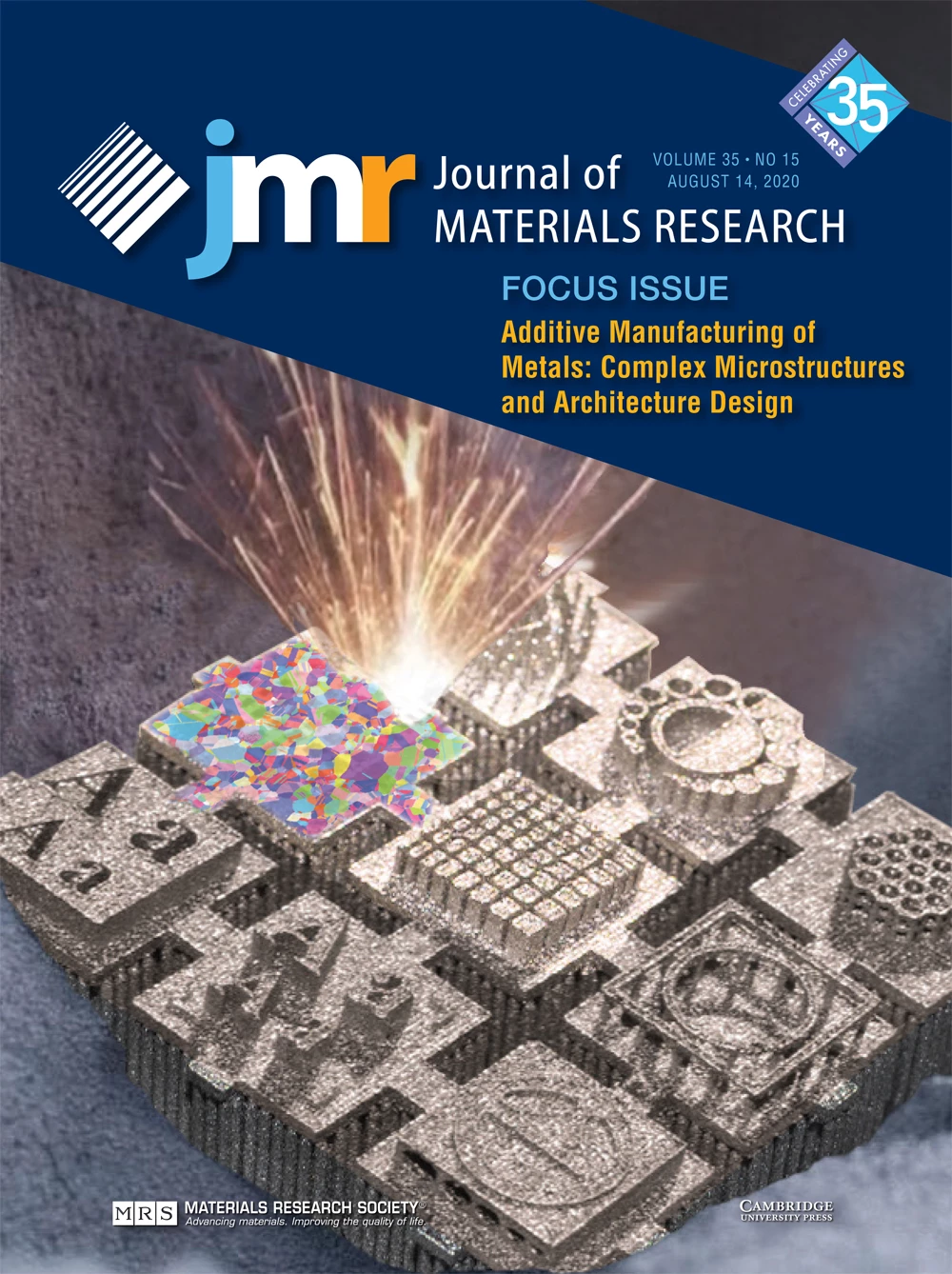Additive Manufacturing of Metals: Complex Microstructures and Architecture Design
This webinar was presented in conjunction with the August, 2020 Journal of Materials Research Focus Issue on this topic, and it featured four talks from experts in the field, followed by live Q&A sessions with each.
Additive manufacturing (AM) is a disruptive technology, not only because it enables the production of components with complex geometries, but also because it provides unique opportunities for microstructure control and materials design. In contrast to conventional manufacturing technologies,such as casting, forging, and hot rolling, AM offers additional degrees of freedom to “architect” the material microstructure across many length scales. Owing to this unique capability, both beam-based processes—such as power bed fusion (PBF) and directed energy deposition (DED)—as well as non-beam-based processes—such as cold spray, additive friction stir deposition, and ultrasonic additive manufacturing—unlock new opportunities for tailoring mechanical and functional properties of metals and alloys.
In this webinar and associated JMR Focus Issue, we highlight research on the microstructures resulting from different AM processes and their impact on the mechanical and physical properties of metallic materials. The issue includes both experimental and modeling works focusing on different materials systems, such as steels, aluminum-,titanium-, and nickel-base alloys, refractory metals, and high entropy alloys. We have also captured a portion of the broad spectrum of research in AM, from finite element simulations and topology optimization to microstructure characterization and mechanical testing. Many new tools, such as machine learning methods, have become powerful for AM.
Talk presentations:
Microstructure and Texture in Metals Additive Manufacturing
Anthony Rollett, Carnegie Mellon University
Talk begins at 8:56
Materials and manufacturing renaissance: Additive manufacturing of high-entropy alloys
Atieh Moridi, Cornell University
Talk begins at 27:38
Heterogeneous microstructures and mechanical behavior of additively manufactured copper matrix composite
Qiang Guo, Shanghai Jiao Tong University
Talk begins at 50:24
Investigation of Process-Induced Defects in Additively Built Lattice Materials:
Material Microstructure and Morphological Variations
Damiano Pasini, McGill University
Talk begins at 1:17:42
SPONSORED BY COMSOL and Taiyo Nippon Sanso.
We invite you to view these videos from Taiyo Nippon Sanso.

Liquid Phase Electron Microscopy
With the technical advances in transmission electron microscopy (TEM), liquid phase TEM is transforming our ability to characterize materials and revolutionizing our understanding of many fundamental processes in materials science and other fields. The September, 2020 issue of MRS Bulletin will examine the role of liquid cell electron microscopy in accelerating materials and process discovery, with a great impact on science and technology.
This webinar will expand upon and complement the articles in this MRS Bulletin issue with talks from leading experts in the field. An interactive Q&A session will follow each of the talks.
Talk presentations:
The "life cycle" of nanocrystals observed by liquid-cell TEM
Qian Chen, University of Illinois
Talk begins at 11:15In situ Electrochemical Scanning/Transmission Electron Microscopy
Raymond Unocic, Oak Ridge National Laboratory
Talk begins at 38:22Chemical & Physical Transformations of Carbon-Based Nanomaterials Observed by Liquid Phase TEM
Nathan Gianneschi, Northwestern University
Talk begins at 1:10:05
Sponsored by American Elements
Essentials of Getting Your Work Published
I've Done My Research, Now What?
Whether you are a student preparing to publish your first paper, an early-career researcher hoping to polish your publishing skills, or if you just have questions about the publishing process, then this interactive "how to" session is for you. Learn the fundamentals of successful scientific publishing from MRS journal Editors-in-Chief and other respected scientific journal professionals. Not only are they leading researchers in their field, but they share a dedication to high-quality content, editorial integrity and scientific scholarship.
Sponsored by Taiyo Nippon Sanso. We invite you to view these videos about our sponsor.
Outstanding Virtual Oral Presentations
Whether you are giving a talk for a class, at a (virtual) conference, or to get a job, it is essential that you shine in every way. Learn the essentials of giving an excellent speech every time. Discover what a speech says about you, how to prepare for a speech, how to combat anxiety, and how to show confidence and poise. Speaking, articulation, and projection techniques, interaction with the audience, and specific presentation issues for scientists/engineers and for science-based conferences will be addressed. And of course, since 100% of our oral presentations are via virtual means, we will delve into the logistics and considerations we can keep in mind as we speak via webcam and present via zoom.
Talk begins at 5:09
MRS Communications 10th Anniversary Lectures, Part 1
This event, in honor of the 10th anniversary of MRS Communications, will feature talks from Joseph M. DeSimone who holds a joint appointment in the Stanford Department of Chemical Engineering and the Department of Radiology in the Stanford School of Medicine, and Grace Gu, Assistant Professor of Mechanical Engineering at the University of California, Berkeley. Dr. Gu was selected to deliver the 2020 MRS Communications Lecture based on her work in artificial intelligence for materials design and additive manufacturing.
Both speakers will hold live Q&A sessions with the audience at the conclusion of their respective talks.
Talk Presentations:
- Digital Transformation in Manufacturing
Joseph M. DeSimone, Stanford University
Talk begins at 10:55
- Machine learning for composite materials
Grace Gu, University of California, Berkeley
Talk begins at 50:48
Grace Gu's abstract: Machine learning (ML) has been perceived as a promising tool for the design and discovery of novel materials for a broad range of applications. In this talk, we will discuss computational methods and ML algorithms that can be used to investigate design principles and mechanisms embedded in materials with superior properties. Additionally, we will present algorithms and sensor technologies that can be implemented to detect and resolve problems in current additive manufacturing processes, allowing for automated quality assessment and the creation of functional and reliable structural materials. In the future, this algorithmically driven approach will enable materials-by-design of complex architectures, opening up new avenues of research on advanced materials with specific functions and desired properties.
Joseph M. DeSimone abstract: Until recently, 3D printing was largely relegated to prototyping and small-scale projects due to fundamental limitations—slowness and an inability to generate objects with adequate mechanical strength and thermal properties that would entail widespread, durable utility. A limited range of materials also hindered the ability to make parts comparable to injection molded parts. Rethinking the basic physics and chemistry, we invented Digital Light SynthesisTM (DLS) to address these longstanding major drawbacks. Introduced on the cover of Science [2015, 347, 1349], DLS is now transforming how parts are manufactured in industries including automotive, footwear, and medicine. Its revolutionary nature as a digital manufacturing technology creates possibilities for market-shifting transformations with significant economic and environmental implications. This lecture will discuss opportunities and challenges associated with launching a subscription-based digital manufacturing breakthrough. Digital transformation is easy for software-centric products and businesses but much harder for products and businesses in the physical world. Greater momentum now exists for this digital transformation due to the technological revolution in additive manufacturing (3D printing) and the urgency for greater dynamism and adaptability in supply chains—with the COVID-19 pandemic serving as the clearest example of the economic and societal challenges that occur when supply chains are disrupted on a grand scale. With this transformation, additive manufacturing will enable local-for-local production; continuous digital thread and the smart factory; scaling personalized products (e.g. perfectly fitting prosthetics, surgical implants from advanced imaging modalities); rapid product introductions; and end of inventory with just-in-time production—stimulating greater supply chain dynamism and adaptability.
Banish Impostor Syndrome for Good! Strategies and Tactics for Dealing with Self-Doubt
Let’s face it- impostor syndrome is terrible. It makes us believe that we unworthy and frauds. It tricks us into minimizing our contributions and value. More critically, impostor syndrome insidiously robs us of future prosperity as it convinces us we do not belong and should not pursue opportunities to advance our career, launch and facilitate exciting new collaborations, and be more innovative, inventive, agile, and novel in our problem-solving. Consequently, impostor syndrome negatively impacts not only our own potential, but that of the greater STEM community. Let’s knock this out of our brains for good! In this webinar, you will learn strategies and tactics to rid this from your brilliant mind and how to navigate it and stamp it out if it creeps into every day scenarios. Banish Impostor Syndrome for good!
Talk begins at 4:07
Sponsored by Taiyo Nippon Sanso. We invite you to view these videos about our sponsor.
MRS Communications 10th Anniversary Lectures, Part 2 (Featuring talks by Zhenan Bao and Keith Brown)
This webinar is presented as part of a celebration of the 10th Anniversary of the MRS Communications journal. Find out more about MRS Communications at mrs.org/mrc.
Talk Presentations:
- Skin-inspired Sensors and Electronics
Zhenan Bao, Stanford University
Talk begins at 7:11
- Autonomous Researchers for Hierarchical Materials
Keith Brown, Boston University
Talk begins at 50:18


